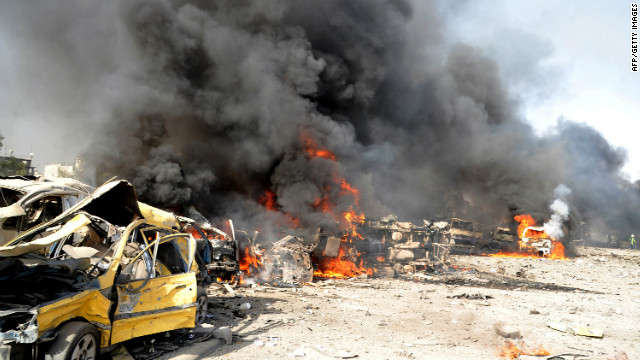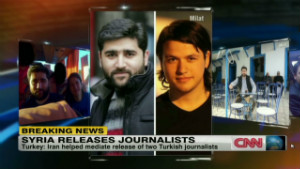
- NEW: An opposition group reports "intense gunfire" in Damascus and elsewhere
- NEW: Another group claims Syria's government is trying to undermine a peace plan
- A video purportedly from a terror group claims responsibility for twin Damascus blasts
- A United Nations observer mission has monitors in several Syrian governorates
Are you there? Send us your images or video.
(CNN) -- A video purportedly released by a shadowy, Syrian-based terrorist group claimed responsibility Saturday for dual suicide bombings that killed dozens and wounded hundreds in the country's capital this week.
The two-minute video, apparently by jihadist group Al Nusra Front, says government buildings were targeted "because the regime continues to shell residential civilians in Damascus countryside, Idlib, Hama, Daraa and other areas. And we remained true to our promise to respond to this shelling with strikes."
Syrian Prime Minister Adel Safar visited the site of the bombings in Damascus on Saturday, state-run media reported.
The suicide attacks were aimed "at striking Syria's will and its people in life, security and stability," Safar said, according to the official Syrian Arab News Agency.
The attacks Thursday killed at least 55 people. The government has blamed "terrorists," while members of the Syrian opposition have blamed the government.
Since the bombings, reports of bloodshed only continue to mount.

 Syria releases journalists
Syria releases journalists The Local Coordination Committees of Syria, an opposition network, reported at least 22 deaths Saturday, three of them children. The dead included one person killed by regime sniper fire in Hama and one man who died from gunshot wounds sustained Friday after regime forces stormed his Deir Ezzor home, the group said.
In all, Saturday's dead consist of six people in Idlib; four each in Homs, Damascus and the Hama suburbs; and one each in Latakia, Deir Ezzor, Aleppo and Daraa, according to the opposition group.
Meanwhile, fresh explosions were reported late Saturday and early in Douma and Qteifeh, both suburbs of Damascus. In addition, the Local Coordinating Committees reported "intense gunfire"early Sunday in Damascus, in Ariha in Idlib province and in Daeel in Daraa province.
Nine government soldiers were injured when two armored cars were targeted in clashes between Syrian forces and armed defectors in the village of Hantoteen, in Idlib province, the UK-based Syrian Observatory for Human Rights said.
A homemade bomb also blew up a military vehicle in Maerat Al Nouman in Idlib province, according to state-run Al Dounia television.
Damascus and Aleppo have been the scene of a flurry of attacks in recent months. Aleppo, a commercial center and long a bastion of support for President Bashar al-Assad, had been largely spared in Syria's 14 months of bloody uprising. But recent protests and violence there could signal a significant shift.
Syria's foreign ministry underscored the urban violence in identical letters to U.N. Secretary-General Ban Ki-moon and U.N. Security Council President Agshin Mehdiyev, who is the Azerbaijani ambassador to the United Nations.
The letters said that Damascus, Aleppo and other Syrian cities "witnessed several terrorist bombings over the last weeks" that left dozens of innocent people dead, SANA reported.
Syria blames "terrorists" for the attacks, a term it uses to describe the opposition and to rationalize security forces' crackdown.
Some analysts said the attacks raise concerns about the presence of jihadist elements in Syria, noting Thursday's Damascus strikes resemble suicide car bombings during the sectarian violence in Iraq in the past decade.
But opposition groups have said the regime is responsible for the violence that erupted after government forces began a crackdown on peaceful protests in March 2011. That fierce clampdown spurred a grassroots uprising against the regime.
The opposition Syrian National Council said al-Assad's regime staged Thursday's deadly suicide bombings in Damascus "to spur chaos, disrupt the work of the international observers and divert attention away from other crimes being committed by its forces elsewhere."
"In orchestrating such acts," the council said Friday, "the regime seeks to prove its claims of the existence of 'armed terrorist gangs' in the country that are hindering its so-called 'efforts of political reform.'"
The deadly blasts in Damascus took place near a military intelligence center.
But the council questioned how the attackers could have made it past security to conduct the bombings.
"The security branch is heavily guarded and surrounded with cement barriers at a distance from the exterior fence. It would be reckless to carry out such an attack, because it would in no way impact the security building," the group said.
The same group continued its diplomatic tour Saturday in France, where two of its leaders accused al-Assad's forces of committing atrocities while trying to "distort facts and appear as the victim in front of the United Nations observers."
Khalil Alhaj Saleh and George Sabra, from the Syrian National Council, both accused the government of trying to undermine the effectiveness of a U.N.-backed peace plan that was agreed upon last month.
More than 1,000 people have died since the cease-fire was supposed to go into effect on April 12, according to the LCC.
CNN cannot independently verify reports of deaths and violence because the Syrian government has severely restricted access to international media.
A team of U.N. monitors is on the ground to observe the progress of the cease-fire and encourage the implementation of the peace plan.
On Saturday, the head of the U.N. observer mission, Maj. Gen. Robert Mood, said 157 civilian and military monitors were in the governorates of Daraa, Idleb, Hama and Homs, the state-run Syrian Arab News Agency (SANA) reported. About 300 observers are expected within weeks.
Mood described the situation in Syria as calm, SANA said.
More than 50 countries are involved in the mission, Mood told journalists and SANA.
A cargo plane loaded with six armored Jeeps for the U.N. mission arrived at the Damascus international airport on Saturday, SANA said.
The administrative director of the U.N. mission in Syria, Milan Troyanovic, told SANA that that two more cargo planes were scheduled to arrive later, one bringing six more armored Jeeps and another 13 more, bringing to 25 the number of vehicles to arrive on Saturday, all offered by the European Union.
CNN's Saad Abedine and Joe Sterling contributed to this report.
0 comments:
Post a Comment